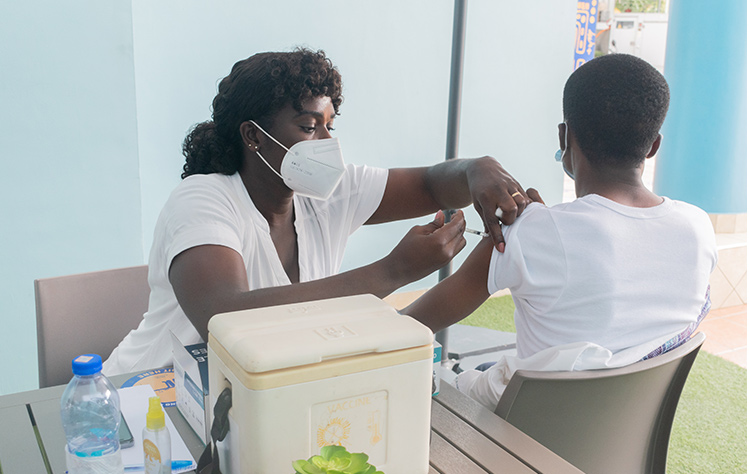Webster Ghana Lecture Dissects Global COVID 19 Vaccine Politics
October 07, 2021
Almost two years into the global fight against COVID-19, many nations in the Global South continue to struggle to receive adequate vaccination doses for their populations. Webster University Ghana held its Fall Public Lecture via Zoom on Oct. 6 to examine the current COVID situation around the globe and discuss how Africans can also respond positively to the COVID 19 pandemic fight. This was the 20th lecture within this thought leadership series crafted by Webster's campus in Accra.

Moderated by Dr. Felix Danso, the head of department for international relations at Webster Ghana, the event sought to educate the public on the pandemic, and critically discuss the politics and inequalities in the access and production of COVID 19 vaccines. It also focused on the way forward for Africa in the context of these inequalities.
The panel featured Prof. Julius Fobil, Provost of the College of Health Sciences at the University of Ghana; Dr. Tony Ao, Ghana Country Director at the Centers for Disease Control (CDC); and Dr. Edinam Agbenu, a Vaccine Safety and Quality Officer at World Health Organization (WHO).
Dr. Ao commended the Ghana Health Service for their vaccine rollout efforts and shared aspects of the CDC’s strategy for the global response to COVID-19
Fobil, whose lecture was focused on how COVID 19 vaccine politics are affecting Africa’s response to the fight against COVID 19, kicked things off by running the audience through the history of pandemics with a close lens on those that have significantly affected Africa, including smallpox, HIV and Ebola. He shared that Egypt was the first country to report a COVID-19 case in 2020 and on Ghana’s COVID 19 profile, he reported that as of Oct. 6, 2021, Ghana was reporting 167 daily, being the first country in Africa to receive vaccines through COVAX (600,000).
Fobil mentioned that Morocco has the highest number of inoculations on the continent, exceeding 39 million doses, as well as the highest vaccination rate per 100 people, behind Seychelles and Mauritius. With only 20% of nations having achieved the goal deadline for vaccinating the most vulnerable by September 2021, Africa is gravely behind and will remain so if the pace of vaccine delivery does not improve. Fobil lamented at just 3% of African populations being fully vaccinated compared to almost 60% in the United States. He pressed that Africa rely on science and concluded it best country leaders stay out of politics in order to stay ahead in fighting the pandemic.
Looking at what the U.S. role is in ensuring vaccine equity across the globe, Dr. Ao commenced by speaking to the latest vaccination donation from the U.S. government received by U.S. Ambassador Stephanie Sullivan alongside dignitaries from the government of Ghana in September 2021, exhibiting the U.S. commitment to ensuring African countries receive a fair share of COVID-19 vaccines.
Ao shared data on vaccine receipt per region across the globe. The Western Pacific Region has the highest population rate having received at least one dose, while Africa is the lowest at 4%. He shared that the U.S. seeks to offer better equity through coordinated accelerated vaccine distribution efforts with the support of G7 partners, the EU, COVAX, etc.
He reiterated U.S. President Biden’s support of the WHO’s goals to vaccinate at least 70% of the world’s population within the next year, laid out at the September 2021 Global COVID-19 Summit. The U.S. has to date donated 177 million vaccinations doses worldwide. Dr. Ao commended the Ghana Health Service for their vaccine rollout efforts and shared the various activities planned to support the CDC’s strategy for the global response to COVID-19.
Speaking on behalf of Africa’s WHO office, Dr. Agbenu’s lecture centered around the strategy Africa should adopt with regards to vaccine politics to win the fight against the Covid-19 pandemic. She laid the foundation by stressing the importance of immunizations being the most effective method for medical intervention, having prevented 4-5 million deaths annually, and how herd immunity has helped keep the number of cases at bay. The WHO is targeting 70% vaccination across the globe by June of 2022. Only 16 African countries have 10% of the populations’ vaccinated. Dr. Agbenu reviewed the factors negatively affecting the numbers including insufficient vaccination supply (erratic supply quantities and delivery schedules), misinformation and inadequate workforce. The WHO is focusing on equity, leadership, funding and research as a strategy to win the fight against the COVID-19 pandemic. She concluded with a poll that revealed that most of the webinar event guests are fully vaccinated.

Guests were able to liaise with the panelists in a Q&A session, asking several engaging questions around booster vaccines, awareness campaigns within African nations to fight fake news, and pledges from President Biden, to name a few.
The event aligns with Webster Ghana’s dedication to doing its part in protecting our community against coronavirus. This month, the campus hosted the first vaccination clinic, allowing willing students, faculty and staff to take a first dose. Efforts are being made to arrange for additional vaccination days on the premises.
